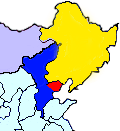Hebei–Chahar Political Council
This article needs additional citations for verification. (July 2020) |

The Hebei–Chahar (or Hopeh-Chahar) Political Council, or Hebei-Chahar Political Commission (Chinese: 冀察政務委員會; pinyin: Jìchá zhèngwù wěiyuánhuì; Wade–Giles: Chi-ch'a chêng-wu wei-yüan-hui), was a political body established under General Song Zheyuan, on 18 December 1935 to rule over the two northern Chinese provinces of Hopeh and Chahar
During mid-1933, the Kuomintang government in Nanking sought to strengthen control over the northern provinces of Hopeh and Chahar, then under the control of Song's 29th Army. As such, Ho Ying-ch'in replaced Chang Hsüeh-liang as head of the Peiping Branch Military Council and Huang Fu installed as head of the new Political Affairs Commission, both men being Kuomintang officials loyal to Nanking. Their impact, however, was limited, and any improvement of relations between the 29th Army and the central government came from personal relationships, such as that between Song and Liu Chien-ch'ün, political education officer in the 29th Army.[1]
In 1935, under Japanese pressure, China signed the Ho-Umezu Agreement, which forbade the Kuomintang from conducting party operations in Hopeh, thus obliging the removal of all central government influence from the PAC and BMC, and both Ho and Huang returned to the capital.[2] In May of the same year, the Qin-Doihara Agreement was signed, removing Song as governor of Chahar and essentially removing all KMT influence there. By the end of 1935, the Chinese central government had virtually vacated from North China. In its place, the Japanese, under the direction of Doihara Kenji began a movement to promote autonomy for the five northern provinces of Hopeh, Chahar, Shansi, Shantung and Suiyuan. Retired politicians from the Beiyang government such as Ts'ao K'un, Wu P'ei-fu (formerly of the Chihli clique) and Tuan Ch'i-jui (formerly of the Anhwei clique) were also targeted to serve as potential leaders, and by late autumn the autonomy movement had begun amassing the semblance of a popular base in Peiping, Tientsin and rural Hopeh, culminating in the creation of the Japanese-backed East Hebei Autonomous Council in November.[3] Doihara then diverted most of his overtures towards General Song, hoping to convince him to set up an autonomous government in the Hebei-Chahar region. The latter initially vehemently denied any personal involvement in Japanese plans for the region, and it was only on 19 November 1935, after Doihara presented Song with an ultimatum to declare autonomy or face military reprisal that did he admit to being the target of Japanese overtures, telling Chiang Kai-shek that:
We have had no choice but to begin exploratory discussions with [the Japanese], while supporting the centralized system and remaining within the following limits: non-intervention in China’s domestic politics, non-infringement of China’s territory, equality and mutual amity....
— Song Zheyuan[4]
In December 1935, seeking to re-establish control over the northern provinces, Nanking resolved to dissolve the BMC, establishing the Hopeh-Chahar Political Council in its place, which reported directly to the Wang Ching-wei's Executive Yuan. Nonetheless, discussions with the Japanese continued: in spring 1936, the North China Garrison Army proposed joint political and military action to "prevent the spread of communism" in the region, with an agreement reportedly concluded by 30 March. On 1 October, a preliminary agreement was concluded between Song and Tashiro Kanichirō regarding joint Sino-Japanese economic development of the region, but the talks were suspended after the government in Nanking made clear that no such agreement would be considered valid without its approval.[5] During the latter part of 1936 and early 1937, however, Song moved back towards realignment with Nanking, supporting Chiang Kai-shek during the Sian Incident.
After the fall of Beiping, Song resigned as Chairman of the Hopeh-Chahar Political Council, but it was refused, and he remained in post until the Council was officially dissolved on 20 August 1937/
See also
[edit]References
[edit]- Mikiso Hane, Modern Japan: A Historical Survey, Westview Press, Japan, 2001, 554 pages. ISBN 0-8133-3756-9
